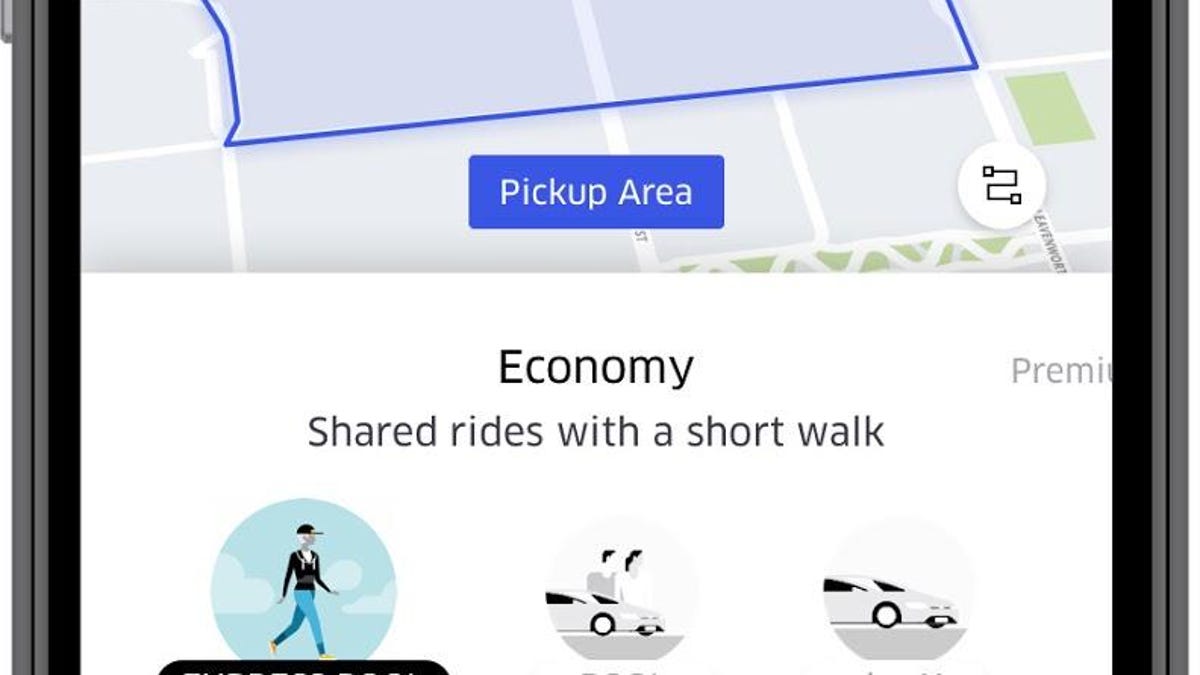Uber Express Pool is coming to town. Move over, buses
The ride-hailing company says the service is up to 50 percent cheaper than regular Pool. So that means it costs… about the same as a bus.
Uber says it wants to be a ride-hailing service that works for everybody.
And, as of Wednesday, it's officially adding a new service to its roster that'll cater to people who don't want to spend a lot of money: a low-cost carpool service called Express Pool.
Typically, when you take an Uber, the driver comes to you. With Express Pool, which is launching in six new cities, you walk to meet the driver at a specific location. In places like San Francisco and Washington, where one-way streets can often send cars off course, Uber says a walk down the block could save riders and drivers time and hassle.
While this may sound a lot like a bus, there are differences. Only three people can ride, for now. You'll actually be in a car, driven by an Uber driver. And routes for Express Pool aren't completely set -- they're dependent on what riders are requesting in specific areas.
"When you request, we say hang tight … while we figure out who your co-riders are," said Ethan Stock, director of shared rides at Uber. Then, "we're asking you to walk about a block and a half from your house to a street corner."
Uber got its start as a high-end black car service in San Francisco in 2009, but over the years it's adapted to the on-demand world. The company now has an array of services, including UberSUV for big groups and the popular UberX, which pairs riders with drivers using their own cars. Uber is now in 75 countries and has given more than 5 billion rides.
The company hopes Express Pool will help it gain even more customers. The idea is to win over new customers with a cheaper fare and keep existing customers with a more efficient system.
"The mission is to make it possible for everyone to experience the magic of Uber every day," Stock said. "And make it affordable to new riders."
Uber already has a low-cost service called Pool, which it launched in August 2014. Pool is now in 36 cities worldwide and has given 1 billion rides. It's basically a carpool service that lets strangers catch a ride together along a similar route. Express Pool is pretty much the same, Uber says, but is more efficient because riders walk to a spot along a common route, rather than having a driver circle around.
Lyft has a similar service called Shuttle, which it rolled out in San Francisco and Chicago last year. It differs a little bit in that, like a bus, drivers go along a fixed route every day during commute hours with the same pickup and dropoff locations. Rides cost between $3 and $4, which can be up to 75 percent cheaper than a regular Lyft.
Uber says Express Pool will be a lot cheaper, too: up to 50 percent lower in cost than Pool and up to 75 percent less than UberX.
I did a test ride and found that a trip that would cost about $10 with UberX would cost about $6 with regular Pool, and about $4 with Express Pool. As far as timing goes, the 1.5-mile trip through downtown San Francisco would take about 17 minutes with UberX, 26 minutes with Pool and between 26 minutes and 36 minutes with Express Pool.
A bus would've cost $2.25, involved some walking, and taken about 20 minutes. Or I could've walked the whole way for free in about 30 minutes.
Part of the reason Express Pool takes a little longer is because after a rider hails a car, there's a two- to three- minute wait period while the app locates other nearby riders going in the same direction. Uber says this wait time ensures the app figures out the most efficient route.
"We add a small amount of time, one to two minutes at the beginning of the ride," Stock said. That's to make it "far more compatible with you."
The company isn't getting rid of Pool for now, so if people are unable to walk or don't want to walk, they can still hail something more affordable than UberX.
Uber started piloting Express Pool in San Francisco in November and then quietly launched it there and in Boston in December. It'll roll the service out to Washington, Los Angeles, Miami, Philadelphia, San Diego and Denver this week, and more cities in coming weeks.
CNET Magazine: Check out a sample of the stories in CNET's newsstand edition.
Life, disrupted: In Europe, millions of refugees are still searching for a safe place to settle. Tech should be part of the solution. But is it?


